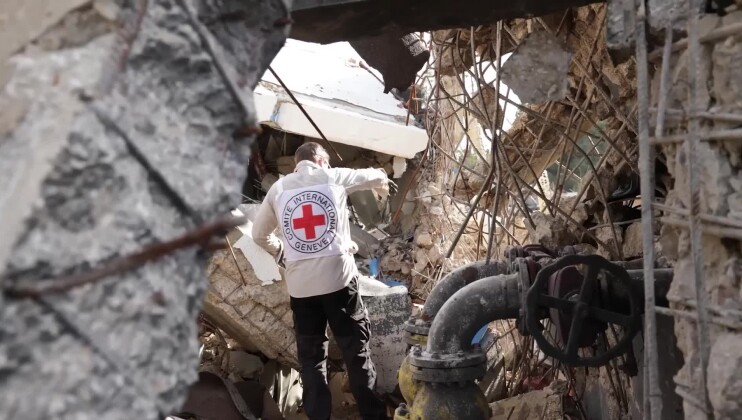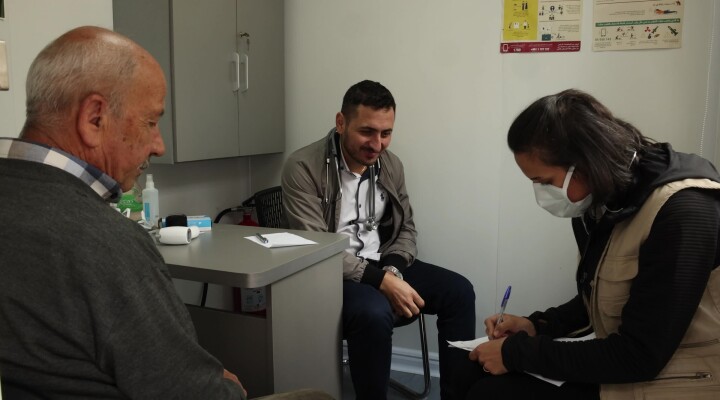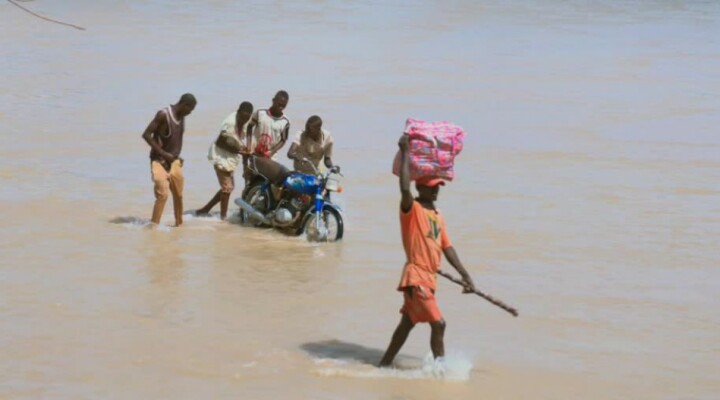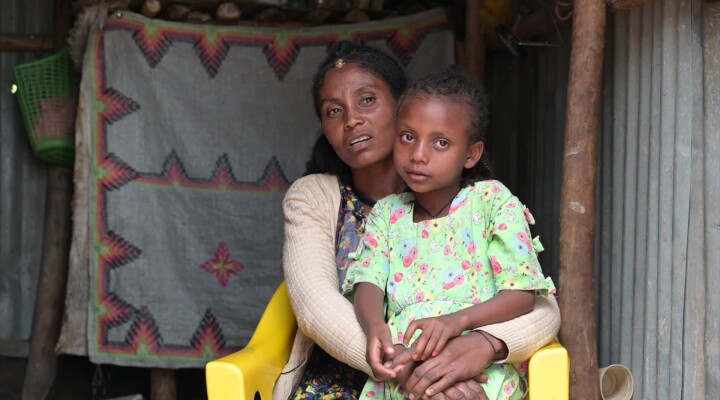COP26: The invisible front line of climate change in conflict zones
As world leaders prepare to meet for the vital climate change conference COP26, the International Committee of the Red Cross (ICRC) is urging the global community to strengthen climate action in conflict-affected states.
Countries enduring conflict are among the most vulnerable to the climate crisis. Every day the ICRC sees how climate change and conflict interact to amplify humanitarian needs and weaken essential services.
The footage issued today illustrates in brutal terms the toll that this dual threat is exacting on communities.
“Here in Mali, I’ve seen for myself how climate change is impacting big time people and communities who are also affected by years of armed conflict and violence,” said Robert Mardini, Director-General of the ICRC from Mopti in central Mali. “I’ve spoken with people who are displaced multiple times, of course, because of violence. But this was exacerbated by extreme weather events that are making life much harder for them.”
Mali, Somalia, the Jordan Valley in the Occupied Palestinian Territories, Niger, Burkina Faso and Iraq all feature in the footage. The stories show how the climate crisis is affecting lives, with people struggling to adapt and recover from repeated climate shocks, pushing communities to abandon their way of life.
Many countries affected by conflict need to urgently strengthen their populations’ ability to adapt to growing climate risks and changes in the natural environment caused by climate change. Yet, they have limited ability to do so alone and they are also among the most neglected by climate finance and action.
Mardini added: “It’s clear that people living in contexts torn by armed conflict are the most vulnerable to the climate crisis. And while they should be really top of the list for support, they happen to be really amongst the most neglected. So my message to the world leaders ahead of COP26 is this: it is absolutely critical that they prioritise and help the poorest, the most vulnerable, adapt to the climate change. And it's high time for concrete action, for collective action to avert a massive humanitarian crisis.”
ENDS
SHOTLIST
Location: Mali, Somalia, Jordan Valley, Niger, Burkina Faso, Iraq
Length: 11:30
Format: mp4
Camera: Various
Copyright: ICRC access all
On Screen Credit: ICRC or Logo
MALI
00:00 – 00:17
Aerial view of Bilal Bancor, which is feeling the full force of the invading desert. The dunes have been stabilized to slow their advance. (3 shots)
Soundbite: Abdul Karim Ag Al Hassane. Former farmer, now a livestock herder.
00:17 – 00:24
“All this area was covered by water.”
00:24 – 00:28
“Then the water receded, and trees started to grow around the lake.”
00:28 – 00:30
“Then the trees started to disappear”
00:30 – 00:33
“and people grew crops where the trees used to be.”
00:33 – 00:38
“During the first rebellion, displaced persons arrived. They destroyed the forest.”
00:38 – 00:43
“And once the forest was gone, sand dunes formed.”
00:43 – 00:50
Lake Faguibine has been replaced by an expanse of cracked earth, with just a few shells to show that once there was water and life. (2 shots)
00:50 – 01:04
Animal carcasses. (4 shots)
01:04 – 01:12
Aerial view of burnt earth where the lake used to be.
01:12 – 01:18
Images of dried-up plants and dead wood. (2 shots)
01:18 – 01:41
Moussa Mouhamadou Touré, shows how the texture and color of the soil has changed due to gas
01:41 – 02:01
Smoke rises from the earth burned by the gas. Moussa scratches the surface, revealing glowing embers. (4 shots)
SOUNDBITE – Moussa Mouhamadou Touré
02:01 – 02:10
“The gas has burned all the soil. The trees. The earth has changed colour. We have to deal with all these problems.
02:10 – 02:14
“There was a big forest here. Before that there was the lake, where we used to grow our crops.”
02:14 – 02:20
“The forest grew following the droughts. And after the forest came the gas.”
02:20 – 02:24
“The gas has eaten up all the trees we had.”
SOMALIA
02:24 – 02:37
Overhead shots of animal bones (2 shots)
02:37 – 02:56
Shot of herders watering their camels in Tula Qorah
02:56 – 03:05
Shot of water in well.
SOUNDBITE – Abdi Ali, herder
03:05 – 03:07
“We say the weather has changed.”
03:07 – 03:13
“The seasons are changing, and the drought keeps coming back which is something we have not seen before.”
SOUNDBITE – Mohamed Hassan, herder
03:13 – 03:17
“If the droughts continue and the animals become fewer,
03:17 – 03:25
“this way of life if in real danger. That is our fear.”
03:25 – 03:29
Mohamed Hassan dress the goat kids from their pen (thorn bush)
03:29 – 03:38
Mohamed Hassan outside his home with his goats
JORDAN VALLEY
03:38 – 03:45
Shot of Sun high in the sky with no clouds.
03:45 – 04.02
Shots of well (3 shots)
SOUNDBITE – Mahdi Daraghmeh – Head of The Village Council in Jordan Valley
04:02 – 04:09
“The Jordan Valley suffers from a lack of water, desertification and dry springs.”
04:09 – 04:14
“We used to have eleven springs here”
04:14 – 04:18
“The main one was Hammamt al-Maleh”
04:18 – 04:20
“which had water all year round.”
04:20 – 04:22
“With the water drying up”
04:22 – 04:24
“most of the irrigated crops stopped growing.”
04:24 – 04:32
Cow walking next to dried up stream
04:32 – 04:39
Herd of cows on dry field
NIGER
04:39 – 04:43
Wide shot of single tree in a dry landscape.
04:43 – 05:02
Aerial view of Boubacar Moukaila’s herd crossing the river to reach the ICRC immunization site.
SOUNDBITE - Boubacar Moukaila, herder
05:02 – 05:08
“Not long ago, my children used to go as far as Azawad to graze our herd. There was good grass there.”
05:08 – 05:13
“But now, we have to stay here. We’re too afraid of getting attacked if we move the herd.”
05:13 – 05:18
“There never used to be any security problems.”
05:18 – 05:21
“It was rare to see animals die of hunger.”
05:21 – 05:26
“Now the pastures are cut off from us.”
05:26 – 05:31
“No one will risk dying to go there.”
05:31 – 05:40
Aerial view of the Nguel Ichip well. (3 shots)
05:40 – 05:56
A camel and other animals drink from the well. (5 shots)
BURKINA FASO
05:56 – 06:11
Herd of cattle walking through dusty and dry fields (2 shots)
06:11 – 06:24
Farmer tilling land in preparation for planting (2 shots)
SOUNDBITE - Sondé Koéranga, Herder
06:24 – 06:30
“Water has become a major problem in the village. This was not the case a few years ago.”
06:30 – 06:45
“There you can see behind us that there are currently few people at the water point. But there are times during the day when it is crowded. And the arguments are numerous.”
06:45 – 07:00
“You can spend all day at the well to get just one can. And it is even more complicated when the herds arrive to drink. During this time, we cannot take care of the family and the children at home.”
07:00 – 07:17
Children pumping water at watering point (2 shots)
07:17 – 07:31
Cattle drinking water at watering point (2 shots)
IRAQ
07:31 – 07:46
Shots of desert landscape with dried palm tree stumps (2 shots)
07:46 – 08:05
Shots of Cut palm trees since Iraq- Iran war (3 shots)
08:05 – 08:21
Shots of dry, cracked earth (2 shots)
08:21 – 08:32
Shots of war related debris on ground. (2 shots)
SOUNDBITE – Robert Mardini - Director General, ICRC (ENGLISH)
08:32 – 08:46
“Well, here in Mali, I've seen for myself how climate change is impacting big time people and communities who are also affected by years of armed violence and conflict.”
08:46 – 08:52
“I've spoken with people who are displaced multiple times, of course, because of violence.”
08:52 – 08:58
“But this was exacerbated by extreme weather events that are making life much harder for them.”
08:58 – 09:07
“So it's clear that people living in contexts torn by armed conflict are the most vulnerable to to the climate crisis.”
09:07 – 09:16
“And while they should be really top of the list for support, they happen to be really amongst the most neglected.”
09:16 – 09:34
“So my message to the world leaders ahead of COP26 is this; it is absolutely critical that they prioritise and help the poorest, the most vulnerable, adapt to the climate change.”
09:34 – 09:41
“And it's high time for concrete action, for collective action to avert a massive humanitarian crisis.”
SOUNDBITE – Robert Mardini - Director General, ICRC (FRENCH)
09:41 –09:54
“Bon, ici au Mali, j'ai pu voir de mes propres yeux comment le changement climatique impacte de manière directe les communautés qui souffrent aussi d'ailleurs de décennies de conflits armés.”
09:54 – 10:13
“J'ai discuté avec des personnes et des communautés qui ont été déplacées plusieurs fois, bien sûr à cause du conflit. Mais aussi, ces déplacements ont été rendus beaucoup plus difficiles à cause des d'épisodes climatiques extrêmes comme les inondations et les sécheresses.”
10:13 – 10:23
“Il est clair que les gens qui vivent dans des conflits armés sont les plus vulnérables face à la crise climatique globale.”
10:23 – 10:31
“Et il se trouve malheureusement alors qu'ils devraient être vraiment en tête de liste pour être ceux qui reçoivent le soutien et le support.”
10:31 – 10:41
“Ils se retrouvent vraiment totalement négligés par les actions climatiques et les financements climatiques, donc le message pour les responsables.”
10:41 – 10:57
“Dans le cadre de COP 26, c'est vraiment il faut prioriser l'aide et les financements pour les communautés les plus pauvres et les plus affectées par les conflits armés, par les changements climatiques pour éviter une catastrophe humanitaire d'envergure.”
10:57 – 11:17
Robert Mardini in discussion with people at Socoura displaced peoples camp in Sévaré, Mopti region, Mali. (3 shots)
11:17 – 11:30
Robert Mardini walking in Socoura displaced peoples camp in Sévaré, Mopti region, Mali
For more information, please contact
Halimatou Amadou, Bamako, +221 781 864 687, hamadou@icrc.org,
Sam Smith, London, +44 7809 374 593, ssmith@icrc.org
Crystal Wells, Geneva, +41 79 642 80 56, cwells@icrc.org



